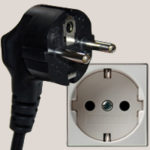Know before you go
Portugal
General Information
Portugal is located on the Iberian Peninsula in Southwestern Europe bordering only Spain. Its capital and largest city is Lisbon (Lisboa). Portugal is a member of European Union and part of Schengen. They drive on the right side of the road
Visa
Holders of a EU passport don’t require a Visa. For holders of a different passport check out this link to see if you are required to apply for a visa or not or contact your ministery of foreign affairs.
Watch Geography Now!
The video will give you a good first overview of Portugal.

Power
Portugal uses Type F plug outlets (“Schuko”). They also work with Type C and E. The voltage is 230 Volt and the frequency is 50 Hz.
Language
| Portuguese | English |
|---|---|
| Olá! | Hello! |
| Tchau!/Adeus! | Bye! |
| sim | yes |
| não | no |
| Obrigado!/ Obrigada! | Thank you! |
| De nada | You're welcome! |
| Desculpe | Excuse me! |
| Saúde! | Cheers! |
Weather Forecast
Climate
Portugal has a Mediterranean climate and is one of the warmest countries in Europe. It has around 2500 to 3200 hours of sunshine a year, an average of 4–6 h in winter and 10–12 h in the summer, with higher values in the south-east and lower in the north-west. Both the archipelagos of the Azores and Madeira have a subtropical climate, although variations between islands exist
Average Temperature in Lisbon
Average Precipitation in Lisbon
Transportation
How to get there?
If you fly to Portugal, chances are high you will go to Lisbon Airport (LIS). From there the Metro will take you to the city center in around 20 minutes costing 1,40€.
When going to the Azores or Madeira you might be lucky to have a direct connection from your departure airport, otherwise you will most likely have to transfer at Lisboa Airport. Here you will find a list of all airports in Portugal.
How to get around?
In the city center of Lisbon it’s best to use the Metro. Ticket prices are reasonable and public transport will take you anywhere in the city. Plan your activities for the day and compare ticket prices. If you are just going to a place and back it is cheaper to by two single rides (2 x 1,45€) than getting a 24h ticket (6,30€)
Money, Money, Money

Currency
Portugal is part of the Eurozone and therefore uses the Euro as its currency. Check out the currency converter to find out about current exchange rates.
Accommodation
Depending on where you are staying prices will vary of course. Using a combination of Airbnb and a hotel, we paid an average of around 40€ per person per night.
Cash
Even though credit cards are widely accepted, you should still withdraw Euros at an ATM. Cash is still king in many places like restaurants, markets and small shops. So, the big question is: how much will you need? Retrospective I found I needed around 40€ per day. This includes food, transportation, activities and souvenirs.


